4 Nations: Hagel's coming-out party, Matthews is due, and more
Before he boldly accepted Matthew Tkachuk's invitation to fight off the opening faceoff and spoke about playing for the flag rather than the drama, Brandon Hagel was the most anonymous player on Team Canada.
Consider the scene inside Canada's dressing room following last Friday's practice in Brossard, Quebec. There was Hagel, sitting quietly at his stall as a swarm of reporters hung onto every word uttered by neighbor Brad Marchand. One reporter finally acknowledged Hagel's existence and asked for a chat. Sure, he said. The only problem: He was boxed in by all the bodies.
Hagel laughed, maneuvered out of his stall, pulled on a red Team Canada baseball cap, and met the reporter in a quieter spot. He was then asked about the early days of his 4 Nations Face-Off experience and the journey that led to it. He went on to call both the last decade and the last few days a "whirlwind."
"The opportunity here," Hagel said, pausing a couple of beats to soak in the surreal environment. "It's just a dream, you know?"
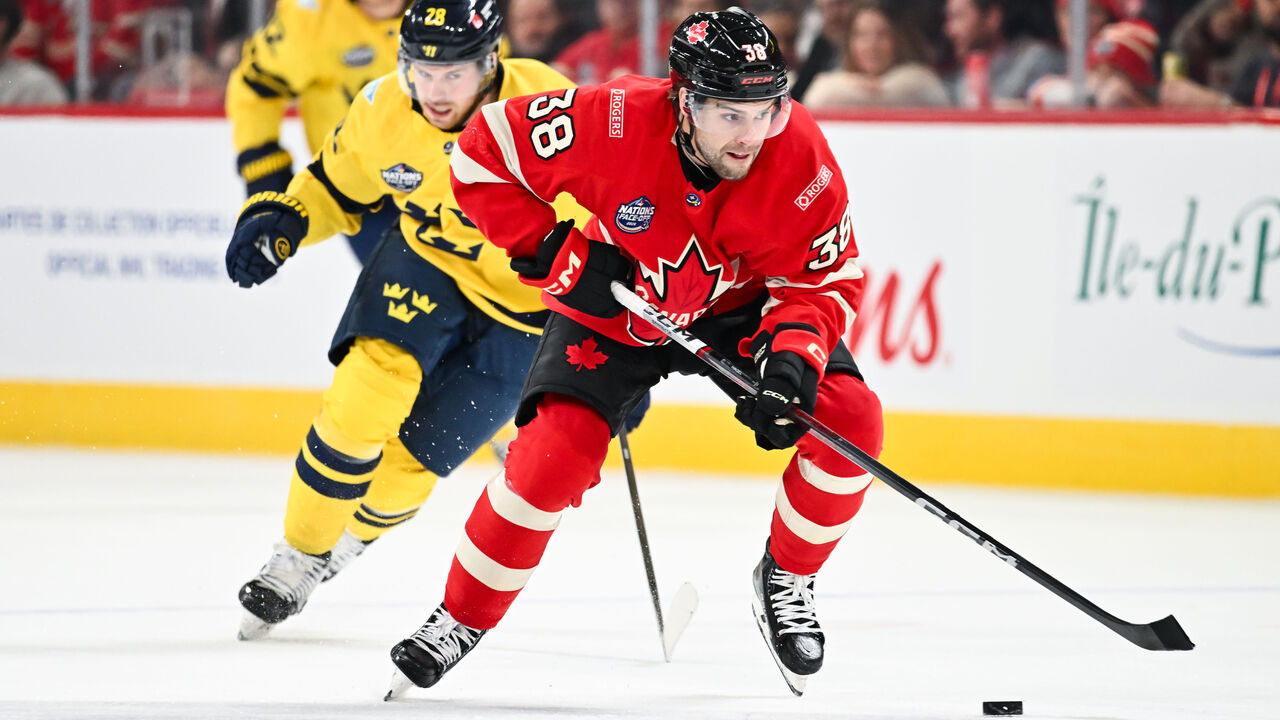
Hagel - who's from Morinville, Alberta, population 10,000 - became a household name roughly 32 hours later. He was the Canadian who dropped the gloves 2 seconds into an epic Saturday night showdown against the United States. It was him who thrust his arms up and down to egg on an already bonkers crowd.
"He's not afraid of the moment," Canada head coach Jon Cooper said prophetically a day before Hagel's center-ice fight with Tkachuk, "even though his road here has been much different than most."
Hagel, 26, was never drafted by a Western Hockey League team. He signed with the Red Deer Rebels as a free agent and eventually caught the eye of NHL scouts. The Sabres selected him in the sixth round, 159th overall, in 2016.
However, Buffalo chose not to sign Hagel within its two-year window. In the summer of 2018, right around his 20th birthday, the wiry winger started thinking about life after hockey. He made a promise to himself: If he didn't make meaningful progress toward signing a contract by Christmas, he'd enroll in university to chase another career, perhaps teaching.
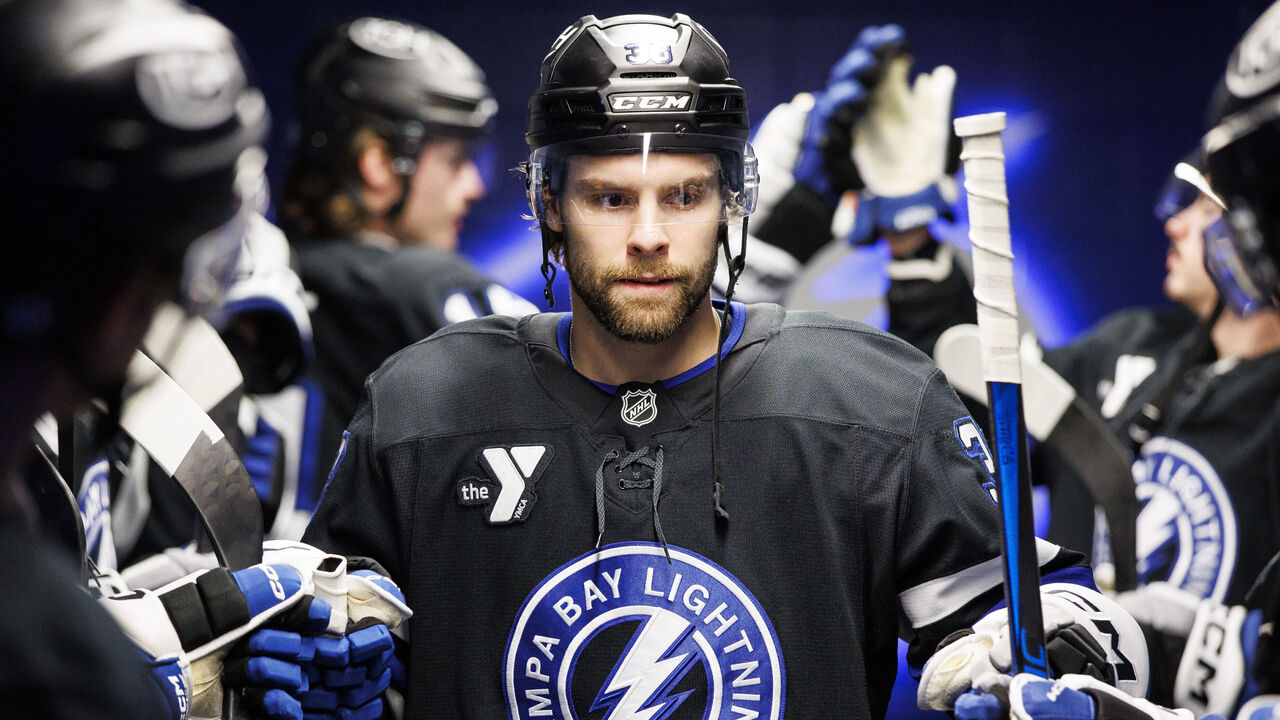
School was on the back burner not even halfway to the holidays, as Hagel popped off in his fourth WHL season (he'd finish 2018-19 with 102 points in 66 games). NHL teams circled. He signed with Chicago, turned pro a few months later, and then played 175 games for the Blackhawks and their AHL affiliate over parts of four seasons. His name first hit the mainstream when the rebuilding Hawks traded Hagel to Cooper's Lightning for a haul - two first-round picks and two prospects. With Tampa Bay, he's done nothing but level up.
Hagel recorded 64 points in 81 games in 2022-23, 75 in 82 games last season, and is on pace for 92 in 82 this year. He left for 4 Nations in a tie with Nathan MacKinnon for third in the NHL in five-on-five points - 39 in 55 games.
"It's just a little bit of that confidence," Hagel said, "where you get yourself into a spot in the league where you're like, f---, I can put some pucks in the net as well. You start doing some stuff maybe you haven't done in the past."
Hagel believes time spent around hockey savants Patrick Kane and Nikita Kucherov has changed his trajectory. "You see a lot, you hear a lot, you learn a lot, and you just go out there and try to replicate it," the 6-foot-2, 180-pounder said. "No better way of getting better than learning from the best."
He took this line of thinking to the extreme this past summer. Hagel ditched the usual plan of working with a skills coach to do drills under Kucherov's watch. "I texted Kuch: 'Hey, when I get to town do you mind if I hop on with you?'" Hagel recalled. "He messages back: 'Yep. Don't miss a day or you're out.'"
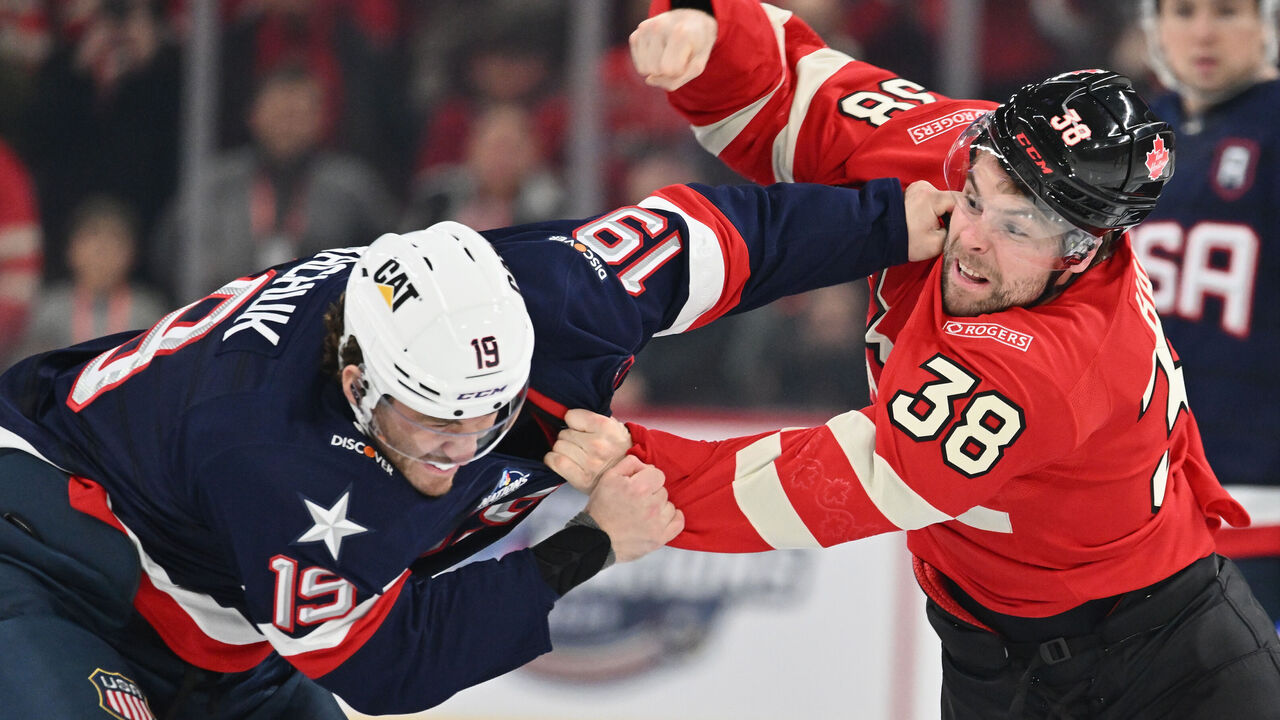
Hagel, who's in the first season of an eight-year deal paying him $6.5 million annually, is something between a wondrous complementary player and a star in his own right. He's speedy, skilled, and works his butt off. Every shift, he grabs the game by the lapels, pursuing the puck and engaging in battles like it's his last moment. Superstars like Kucherov adore the detail in his game.
With Canada, he's getting a regular five-on-five shift, plus penalty-killing duty. He has eight shots on goal (second on the team) and an assist in three games. "He's a Swiss Army knife type of guy who can play all over the lineup and in different situations," Canada defenseman Josh Morrissey said.
"He does all of these things that probably don't make their way into the newspaper - until you're in a tie game with seven minutes left and you need a penalty kill and you need the puck chucked out of the corner 200 feet," Cooper said. "The guy who's doing it is Brandon Hagel. He was brought here to excel in those situations, and he does that. He's just another alpha in a room full of alphas."
Canada's 25-man roster features 14 first-round draft picks, including three No. 1 overall selections. No one else signed his entry-level contract as a free agent, and Mark Stone (178th overall in 2010) was the only guy picked later than Hagel.
"It's insane," Morrissey said of Hagel's story.
"His ascension from playing as a 20-year-old in junior, having an uncertain future, and then making the most of every opportunity since - that's a lesson a lot of people, hockey players, people outside the game, everyone can learn from Hags. It's taken a lot of hard work, I'm sure, but also I see it as him capitalizing on opportunities and making the most out of every situation."
Matthews due ahead of final
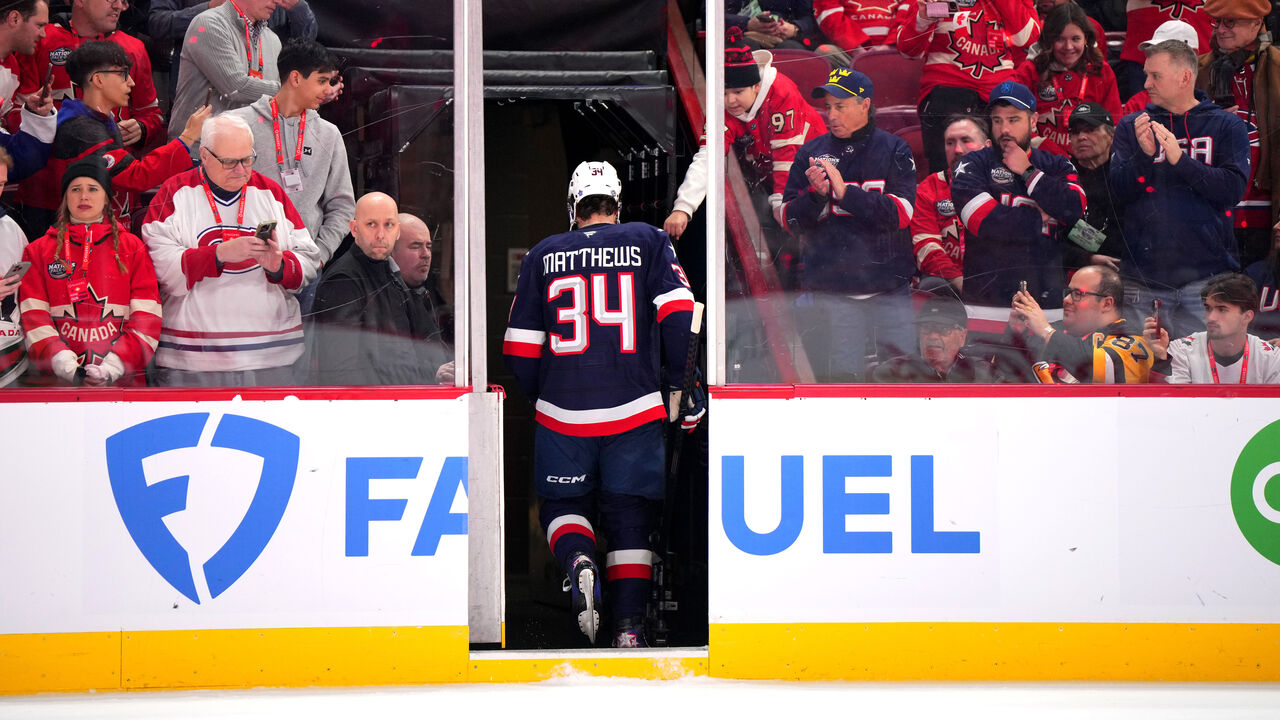
Auston Matthews, the most prolific goal-scorer of his generation, entered the 4 Nations event with zero goals in his final six games with the Maple Leafs.
He also failed to score against Finland and Canada, extending his goalless streak to eight games before sitting out Monday's meeting with Sweden with "upper-body soreness." Matthews will return to the U.S. lineup Thursday, and, as is the case for many players on a relatively young American squad, it will be the biggest game of his life. At the very least, he needs to generate scoring chances.
To be clear, Matthews hasn't been invisible in the tournament, which should give U.S. fans confidence that a breakout may be coming. Matthews, who's registered two shots on goal off seven attempts, rang the crossbar against the Finns. He earned a primary assist on Jake Guentzel's goal off the rush in the same game. His chemistry with Jack Hughes has been building every shift.
Despite playing one fewer game than most teammates, Matthews leads Team USA with eight slot passes. He also owns a team-high 62.9% win percentage on faceoffs and defended extremely well. He's skated for 20 minutes a night.
"Our team's going to go as he goes," center Jack Eichel said of Matthews ahead of the tournament.
Top battle-zone alert: USA's slot
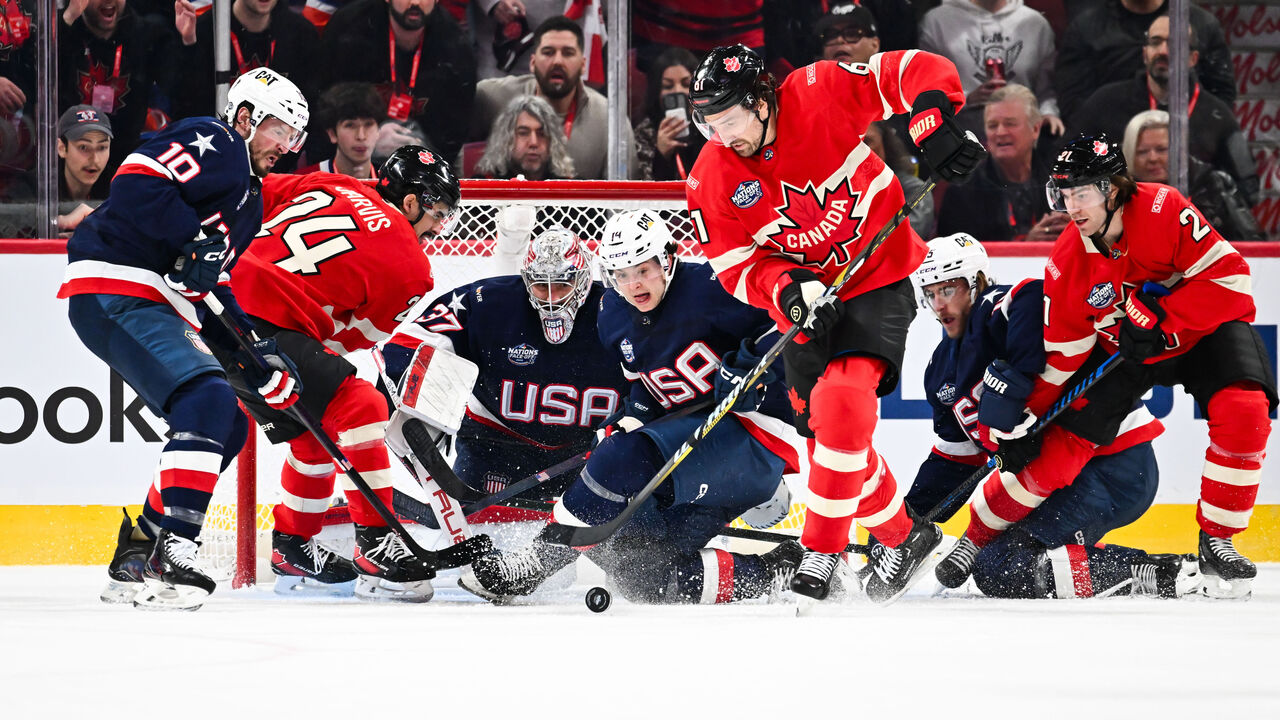
The U.S. won its round-robin game against Canada for a handful of reasons.
The biggest was the lockdown team defense on display most of the match, especially when the U.S. was defending its 2-1 lead in the third period.
Led by Matthews and defenseman Jaccob Slavin, the Americans kept clogging the middle of the ice. There was at least one stick or body - often more than one - occupying space wherever Canadian skaters ventured.
Canada actually controlled the flow of play, according to two Sportlogiq metrics: total time the puck spent in the offensive zone (25:50 versus 19:25 for the U.S.) and offensive-zone puck-on-stick possession time (7:29 versus 4:34).
The Canadians also recorded 34 slot-driving plays to the Americans' 19, but they struggled to get those dangerous shots through traffic, barely edging the U.S. in slot shots on goal (14-12). That means 20 opportunities to score on goalie Connor Hellebuyck died on the stick of a Canadian player.
Superstar defenseman Cale Makar was too ill to dress for the first matchup but will be in Canada's lineup Thursday. He's a rare player capable of slicing and dicing his way through layers of defense. Tip: Watch the U.S. slot.
Cooper's personal rivalry tale
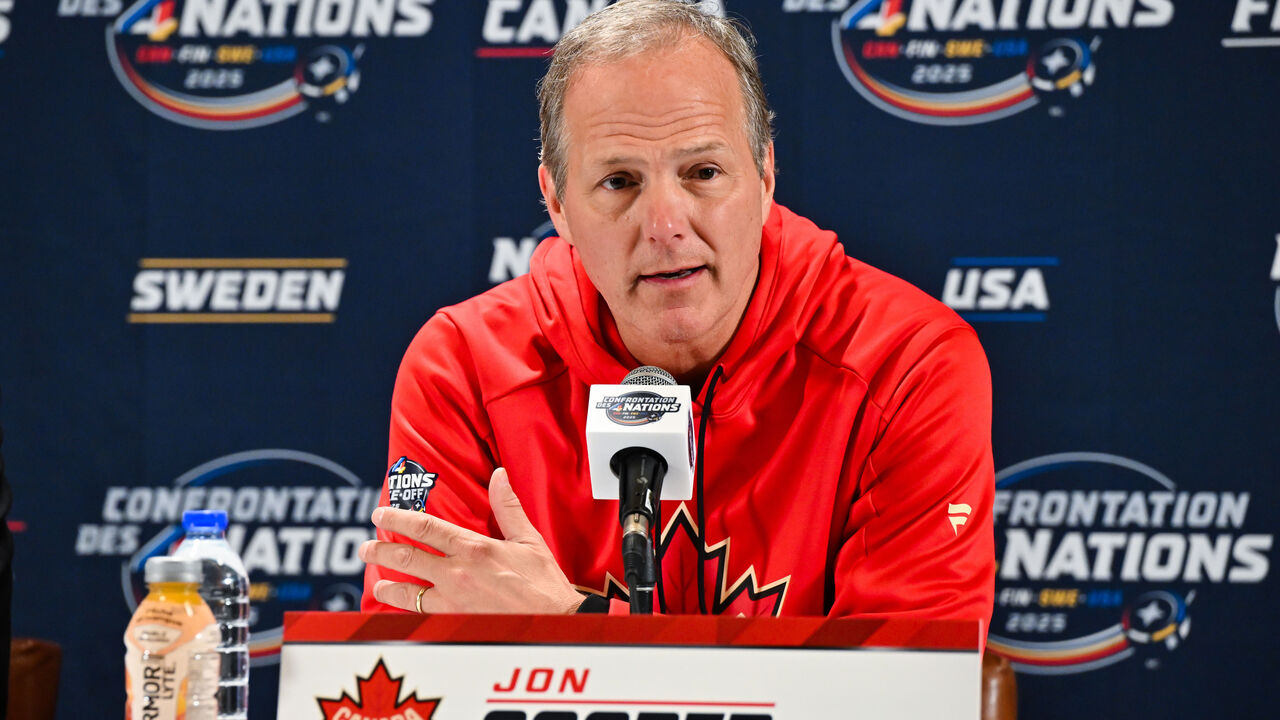
Cooper, 57, was born in Prince George, British Columbia, and raised by a Canadian father and American mother. The family would splinter during the international hockey events of his youth: Christine was a "staunch" U.S. supporter while the rest of the family cheered for Canada.
One Christmas, Cooper bought Christine a rock displaying a photo of the Miracle on Ice team from the 1980 Olympics. It had an interactive button.
"Every time you walked by it and hit the button," Cooper recalled, "it would be (ABC announcer) Al Michaels: 'Do you believe in miracles? Yes!'"
Cooper, one of the great storytellers in NHL circles, laughed as he pictured his father Robert and Christine - a proud San Franciscan who never changed her citizenship after a move to Canada - reacting differently to Michaels' call.
"I thought my dad was going to kill me," he cracked. "Because, for the rest of time, she would just press it any time they were in an argument. It would just drive him nuts."
Cooper shared this tale after being asked if he had any personal connections to the Canada-U.S. rivalry. While the Lightning coach noted the U.S. didn't beat Canada in the 1980 final, his American mother's patriotism has always stuck with him. "Miss her every day," he said of Christine, who died in 2020.
Quick hits
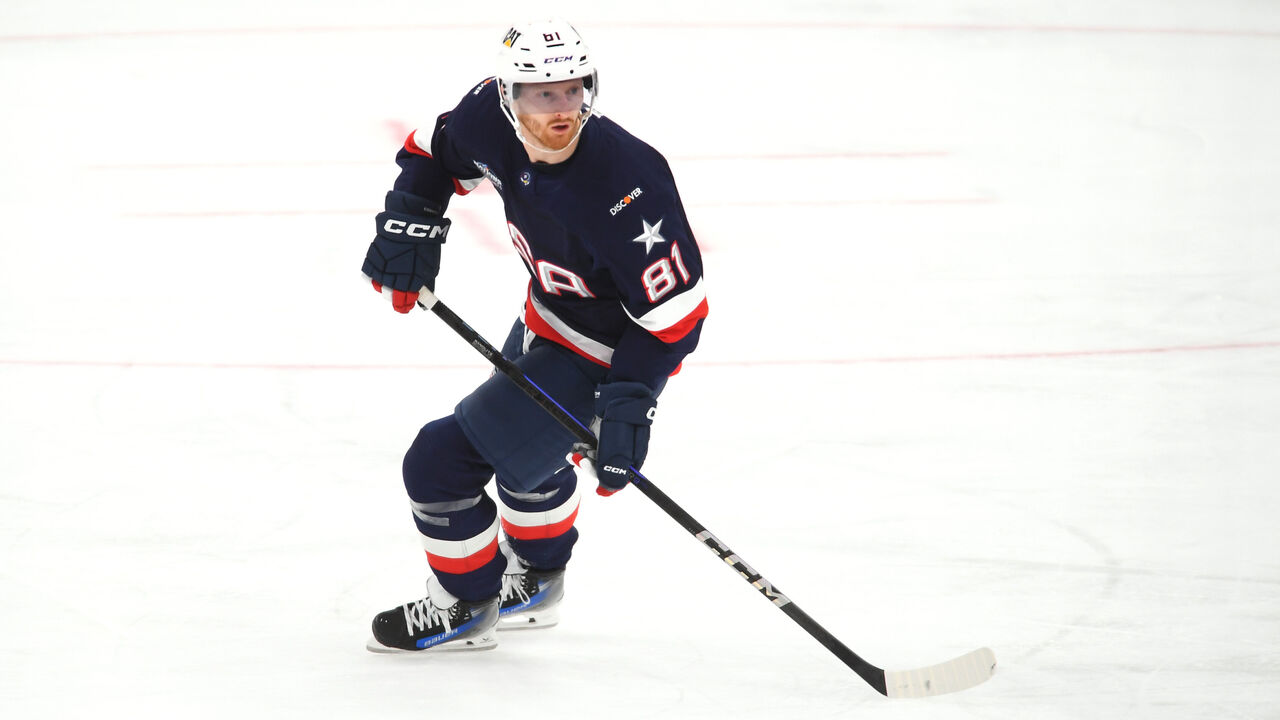
Connor's chance: The championship game provides Kyle Connor with an opportunity for redemption. So far, the Jets' speedy sniper - whose 30 goals in 56 games rank sixth in the NHL - has underwhelmed for Team USA with one shot on goal and one assist. Connor was demoted to the fourth line midway through the opening game, with the Tkachuk brothers hopping on Eichel's wings and never looking back. Similar to Canada's Seth Jarvis, Connor has failed to flash his slippery game-breaking ability in such a tight-checking environment. Unless he pops in the final game, Connor will likely be on the outside looking in when it comes time to select next year's U.S. Olympic roster.
More Petey blues: Elias Pettersson signed an eight-year, $92.8-million contract extension with Vancouver on March 8, 2024. Since then, he's produced 48 points in 69 NHL games and had zero points in three 4 Nations games for Sweden. Pettersson can be an impact defensive center; however, the Canucks aren't paying him seven figures a year strictly for shutdown reasons. The 26-year-old was virtually invisible for Sweden, and his ice time reflected it (13:32 a night to rank ninth among forwards). Meanwhile, less-heralded Wild center Joel Eriksson Ek was tremendous over 19:44 a night: He had a goal and an assist, and he constantly broke up the other team's attack.
Props all around: The NHL announced that 10.1 million people tuned in across North America for the round-robin meeting between Canada and the U.S. That's the highest rating for a non-Stanley Cup Final game since 2014 and a 203% improvement over the 2016 World Cup of Hockey meeting between the same countries. The quality of hockey in this event and Saturday's WWE-style tilt (fights, hits, booing) are producing the ratings.
But the players also deserve credit for how they've handled themselves off the ice. Whether it's Marchand, Sidney Crosby, the Tkachuk brothers, or virtually any other 4 Nations competitor, the NHL's best have happily put themselves in front of cameras. They've been unafraid to show personality or provide a headline-making quote. (Hey, anyone up for a pregame group chat on Thursday?) This is exactly what "growing the game" looks like.
John Matisz is theScore's senior NHL writer. Follow John on Twitter (@MatiszJohn) or contact him via email ([email protected]).